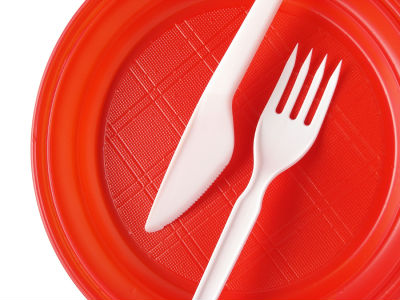
Humans love instant gratification; it feels good and usually makes us feel happy and powerful, but only for a minute. Then, most people start thinking about the extra money spent, calories eaten or
packaging waste created because of their impatience, and they feel bad all over again.
This Earth Day, it’s time to challenge yourself to give up some of those little things that may seem easy and convenient at first glance, but are really trashing the planet in the long run. It’s easier than you think!
Give up disposable dishware and cutlery
Plastic forks and paper plates demand vast amount of petroleum and paper to create, and end up in the landfill after just one use!
Alternative option: Whenever possible, opt for real,
reusable dishware, cutlery and cups. If you eat on the go a lot, think about keeping a set of camping cutlery in your car or computer bag that can be washed and reused. Also, start asking your favorite restaurants and take-out joints to offer biodegradable to-go ware. Remember, the customer is always right!
Give up paper towels
They may be handy for sopping up spills, but these disposable towels are making a mess of our planet. According to the EPA,
paper is the most prevalent material in municipal solid waste. Paper towels are made using a chlorine-bleaching process, which produces organochlorines such as
dioxin. These are highly toxic pollutants that can cause hormone disruption, birth defects and cancer in humans.
Alternative option: A
good old fashioned dish towel,
sponge or cloth napkin. All three of these tools can be washed and used over and over again, while a paper towel is doomed for the landfill because it can’t be recycled.
Give up plastic shopping bags
Current research estimates that 500 billion to 1 trillion plastic bags are used every year, worldwide (that’s about 1 million bags a minute!).
Plastic bags will take up to 1,000 years to biodegrade in a landfill, and even if they do, they release harmful chemicals into the soil and water.
Alternative option: A reusable bag. There are thousands of different varieties on the market, including some that will separate meat from veggies and keep your ice cream from melting. Many stores, including major chains, now provide an instant discount for bringing your own bags, so you’ll save money, too!
Give up bottled water
Did you know that it takes 2 liters of water to produce 1 liter of
bottled water? In 2007, bottled water production in the U.S. used the energy equivalent of 32 to 54 million barrels of oil. That’s enough to fuel about 1.5 million cars for a year. And, to top it all off, only about one in every four bottles are recycled.
Alternative option: According to Food and Water Watch,
tap water has the lowest water footprint and the lowest carbon footprint of any beverage. Invest in a high-quality,
BPA-free, reusable water bottle and carry it with you everywhere. It’s also a good idea to purchase a home water filtration system so that you can have clean, cold, drinking water on hand.
Give up incandescent light bulbs
Traditional light bulbs might be cheaper; they only last for an average of 1,200 hours and cost a whopping $328.59 a year to operate. They also contain about 75% more mercury than their more efficient counterparts.
Alternative option: Passive solar lighting is better on the eyes and is free! When the sun’s not available, CFLs (
compact fluorescent light bulbs) last an average of 8,000 hours and use $76.65 of energy per year. LEDs (
light-emitting diodes) last an average of 50,000 hours and use $32.85 of energy per year.
 Humans love instant gratification; it feels good and usually makes us feel happy and powerful, but only for a minute. Then, most people start thinking about the extra money spent, calories eaten or packaging waste created because of their impatience, and they feel bad all over again.
This Earth Day, it’s time to challenge yourself to give up some of those little things that may seem easy and convenient at first glance, but are really trashing the planet in the long run. It’s easier than you think!
Humans love instant gratification; it feels good and usually makes us feel happy and powerful, but only for a minute. Then, most people start thinking about the extra money spent, calories eaten or packaging waste created because of their impatience, and they feel bad all over again.
This Earth Day, it’s time to challenge yourself to give up some of those little things that may seem easy and convenient at first glance, but are really trashing the planet in the long run. It’s easier than you think!
 Humans love instant gratification; it feels good and usually makes us feel happy and powerful, but only for a minute. Then, most people start thinking about the extra money spent, calories eaten or packaging waste created because of their impatience, and they feel bad all over again.
This Earth Day, it’s time to challenge yourself to give up some of those little things that may seem easy and convenient at first glance, but are really trashing the planet in the long run. It’s easier than you think!
Humans love instant gratification; it feels good and usually makes us feel happy and powerful, but only for a minute. Then, most people start thinking about the extra money spent, calories eaten or packaging waste created because of their impatience, and they feel bad all over again.
This Earth Day, it’s time to challenge yourself to give up some of those little things that may seem easy and convenient at first glance, but are really trashing the planet in the long run. It’s easier than you think!